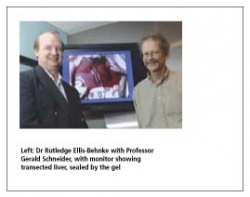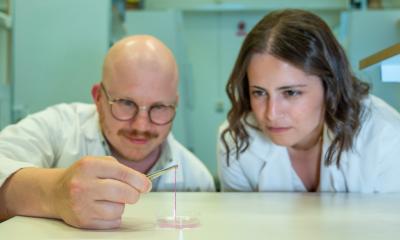Solution revolution for bleeding control
A new biodegradable solution has stopped bleeding in animals' wounds within seconds, according to a report in the journal Nanomedicine.

Lead researcher Dr Rutledge Ellis-Behnke, at the Massachusetts Institute of Technology, USA, who worked on the development with teams in the USA and the University of Hong Kong, said the nanofibre barrier it forms stops bleeding in under 15 seconds, which could revolutionise bleeding control - and even reduce operation times by 50%.
When the solution, composed of peptide, comes in contact with a wound, they self-assemble into a gel, which does not harm cells it contacts, but forms such an effective seal, that even when excess gel is removed the wound is still sealed. Precisely how this solution works is not clear. Wound sealing is too quick to result from clotting, which take about 1-2 minutes to form. Nor was any platelet aggregation at the interface of the material and wound site observed. The researchers believe the peptides interact with the extra-cellular matrix surrounding the cells. Thus, when an injury heals, the gel gradually breaks down into amino acids, which can help cells to repair tissue.
The new solution has been applied to various kinds of tissue, including skin, brain, liver, intestine, and spinal cord, in almost all cases immediately stopping bleeding.
No immune response was observed in animal tests. The researchers also could find no prion-like substances, or fibril tangles, after the material had been implanted in the brain for up to six months.
Other interesting aspects are that this discovery was accidental; it occurred during their investigation of whether peptide solutions can create a self-assembled scaffold for the re-growth of nerve fibres in animal brains - which has helped to partially restore eyesight in animals with a severed visual tract.
No human trials have been undertaken.
16.11.2006





